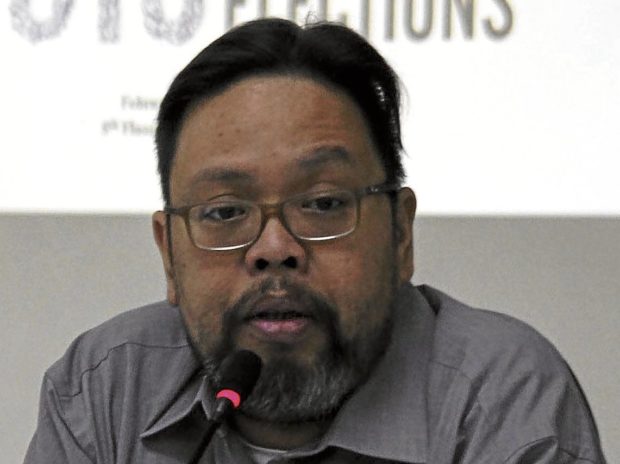
Comelec spokesperson James Jimenez (File photo from Philippine Daily Inquirer)
MANILA, Philippines — The Commission on Elections (Comelec) will not push voters with COVID-19 to participate in the May 2022 polls, James Jimenez, the spokesperson for the poll body, said in a cryptic Twitter post on Friday night.
But he added: “The granular lockdown concept should not be used to prevent people from voting or to force [a] failure of elections.”
“The 2022 national and local elections won’t be postponed or canceled,” he said in another tweet. “There is no way of framing or asking that question that will make it reasonable or give you a different response.”
As early as May 2020, just two months into the pandemic, Jimenez already warned against using the health emergency as a reason to abort the elections.
Romulo Macalintal, a prominent election lawyer, had the same concern, saying the pandemic was a “big challenge” for the Comelec to ensure that those in power would not take advantage of the situation.
Asked whether COVID-19 regulations could prevent bona fide voters from voting, Macalintal said it is the Comelec’s duty to ensure that those in power would not take advantage of the situation.
“The Comelec has complete control and supervision over the polls and all departments of the government are under its control so there is no reason why Comelec should fear any such situation,” he said.
Five alert levels
On Sept. 16, the Inter-Agency Task Force for the Management of Emerging Infectious Diseases (IATF) placed Metro Manila under the pilot community quarantine classification with five alert levels, as well as a new zoning containment strategy — the technical term for a granular lockdown where movement is limited.
A granular lockdown — a quarantined area that is on a scale smaller than an entire town or city — can be enforced on a village, a street, or even just a house tagged as a “critical zone” due to a high risk for COVID-19 infections. The lockdown period is not less than 14 days.
People who live in these areas may return home, but they must remain there for the duration of the lockdown.
The IATF, the government body that is managing the pandemic, has not issued specific rules or guidelines regarding next year’s elections.
Rallies can cause a surge
Former IATF consultant Dr. Tony Leachon said that uncontrolled surges in COVID-19 cases might prompt the use of tighter lockdowns again to slow down the spread of the coronavirus.
“Thus, huge gatherings might be banned, including voting in groups,” he said in a text message to the Inquirer.
“The government should discuss this matter with Comelec [regarding] worst-case scenarios. Political rallies can aggravate the current surge and roll over to the election period,” Leachon said.
IATF member Interior Secretary Eduardo Año pointed out that the polls were still months away.
“We will confer and discuss with Comelec in order to come up with an arrangement or system on how voters inside granular lockdown areas can still cast their votes. One possibility is setting a separate schedule for them,” he told the Inquirer.
Jimenez did not explain his latest tweet and did not respond to the Inquirer’s request for elaboration.
But explaining a recent statement to lawmakers by Comelec Chair Sheriff Abas, Jimenez said on Saturday that, while registered voters could technically vote, the Comelec would not encourage those in isolation to go out just to cast their ballots.
No text voting
Jimenez also dashed any possibility of digital or text voting, as was proposed by Health Undersecretary Maria Rosario Vergeire.
He said this was not authorized by law and “will not be employed on May 9, 2022.”
At a briefing on Friday, Vergerie called on the Comelec to allow text message and digital or virtual voting for those positive for COVID-19.
She was reacting to a statement by Abas who said last week that COVID-19 patients would still be allowed to vote in designated isolation centers at the voting precincts.
“The DOH’s statement clearly misunderstood what the chair was saying,” Jimenez said. “The chairman said that COVID positive patients can vote — and they can. But we are not advocating that those in quarantine break isolation to come to our polling places.”
He said Abas was referring to people with COVID-19 symptoms, not those found to be positive for the virus.
Jimenez said Abas meant that isolation polling places (IPPs) would be set up only for voters who show up on election day with symptoms.
The latest poll conducted under pandemic conditions was the Palawan plebiscite in March. Voters with a temperature higher than 37.5ºC were immediately moved to an IPP.

